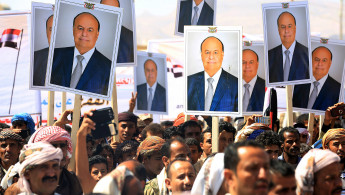Yemen 'offers amnesty to Saleh forces for abandoning Houthis'
"The president will soon announce a general amnesty for all those who collaborated with the Houthis in recent months and who have retracted that allegiance," Prime Minister Ahmad Obaid bin Daghr said.
The move targets former President Ali Abdullah Saleh, whose alliance with the rebels is unravelling. Fighting between formerly allied rebel forces has erupted close to the home of the ex-president in the crisis-hit capital Sanaa, witnesses have reported.
Sanaa residents told The New Arab that fierce clashes between Houthi rebels and Saleh supporters began early on Monday in the city's south-western al-Siyasi district close to the former leader's residence.
A wave of air raids rattled the city on Monday, as clashes also spread beyond Sanaa.
The strikes appeared to hit targets near Sanaa International Airport and the interior ministry, both under the control of the Houthi rebels, according to residents and a source inside the airport.
A military coalition led by Saudi Arabia is the only party in the Yemen war known to conduct air raids on Sanaa.
Fighting erupted between the rebels and forces loyal to Ali Abdullah Saleh last week, unravelling their fragile alliance, formed in the face of the internationally-recognised government and Saudi-led coalition.
Saleh on Saturday announced he was open to talks with Saudi Arabia and its allies on condition they ended their crippling blockade on Yemen's ports and airports - dealing a serious blow to his already fragile alliance with rebel chief Abdul Malik al-Houthi.
Since 2014, Sanaa has been ruled under an agreement between Saleh and the Houthis, who drove the Hadi government out of the capital, set up their own government and for two years together fought the Saudi-led coalition.
The Saleh-Houthi split has sparked fears of a new front in the Yemen war, which has already claimed more than 8,750 lives since the Saudi-led coalition joined the war to support the Hadi government.
The conflict has pushed Yemen to the brink of mass starvation and triggered what the United Nations has called the world's worst humanitarian crisis.





 Follow the Middle East's top stories in English at The New Arab on Google News
Follow the Middle East's top stories in English at The New Arab on Google News


